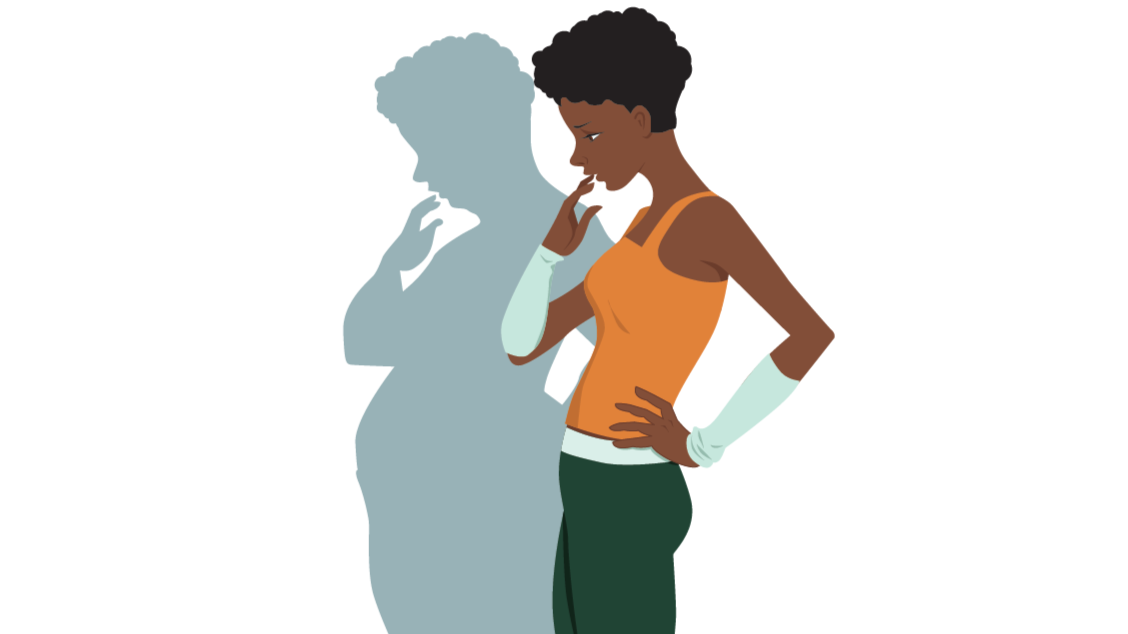Eating disorders are serious mental, physical, and emotional conditions related to persistent eating behaviors that negatively impact health and the ability to function. There is a lack of awareness of eating disorders among the general population; and most believe that eating disorders only happen to affluent, cis, thin, white women. However, eating disorders can affect anyone regardless of race, culture, ethnicity, socio-economic status, gender identity, and sexual orientation.
While no one knows for certain what causes eating disorders, a growing consensus suggests that it is a range of biological, psychological, and sociocultural factors. Even though eating disorders are classified as mental health conditions, they can have physical and physiological stressors as well. The most frequently diagnosed eating disorders are anorexia nervosa, bulimia nervosa, and binge eating.
Anorexia nervosa is the restriction of energy intake relative to requirements leading to significantly low body weight in the context of age, sex, developmental trajectory, and physical health.
Bulimia nervosa is characterized by consuming large amounts of food while feeling out of control and engaging in compensatory behaviors to prevent weight gain. Behaviors may include self-induced vomiting; misuse of laxatives, diuretics, or other medication; fasting; or excessive exercise.
Binge eating disorder is characterized by binge eating (within a two-hour period) without the compensatory behaviors characteristic of Bulimia. The binge-eating episode may be accompanied by eating more than normal, eating until uncomfortably full, eating large amounts of food independent of physical hunger, eating alone due to embarrassment of consuming such large quantities, and guilt after consuming large amounts of food. The binge eating occurs, on average, at least once a week for 3 months.
Many times, eating disorders go unscreened in communities of color. The National Eating Disorder Association (NEDA) says, “Despite similar rates of eating disorders among non-Hispanic whites, Hispanics, African-Americans, and Asians in the United States, people of color are significantly less likely to receive help for their eating issue.”(1)
Even though Black teenagers are 50% more likely than white teenagers to exhibit bulimic behavior, such as binging and purging(1), they are less likely to be treated. Often by the time a person of color has an assessment and diagnosis of an eating disorder, the disease has taken an emotional, mental, and physical toll on their body. In fact, research shows that approximately one in four people with an eating disorder have symptoms of post-traumatic stress disorder (PTSD).
Currently, there are no evidence-based screening tools for eating disorders that are validated in communities of color. Most research, screening, and assessment tools are validated for white Eurocentric women. Trauma, food insecurity, and food accessibility are also not assessed or screened for amongst eating disorder patients. People of color, those who are poor, and many within the LGBTQ community are not adequately being served by the current methods. Untreated mental illness affects every part of life, from being able to feel happiness to forming relationships to earning income and being successful.
While not all of us have the power to change the healthcare system or advocate for more inclusive methods for diagnosing and treating eating disorders, there are ways you can make a difference. According to NEDA, “Up to 40% of overweight girls and 37% of overweight boys are teased about their weight by peers or family members. Weight teasing predicts weight gain, binge eating, and extreme weight control measures.”(2) Be kind and encourage others to be thoughtful towards the young people in your life. Jokes and subtle disparaging comments about their image or weight can be contributing to a developing eating disorder or another health issue.
In general, refrain from speaking negatively about your family and friends’ bodies, comparing them, or engaging in diet talk. Dieting is a multi-billion dollar industry with one of the highest failure rates. Yo-yo dieting and intentional restriction can increase the likelihood of developing disordered eating patterns and eating disorders.
If you or someone you know has shown signs of disordered eating or eating disorders, encourage them to get help. Bluff City Health has a special focus on eating disorders and how they impact communities of color. We offer 1:1 individual nutritional counseling for eating disorders and chronic illness. We also offer nutrition-focused training for anti-racism and social justice.
Whitney Trotter is a registered dietitian, nurse, and certified yoga teacher. With Rachel Haaga, she helped cofound Restore Corps, an anti-trafficking organization. Whitney also is the owner/co-founder of Bluff City Health, a Memphis-based private practice focusing on nutrition and health for those with chronic disease, eating disorders, and disorder eating. Follow her @Whitneytrotter.rd or visit Whitneytrotter.com.
1. https://www.nationaleatingdisorders.org/people-color-and-eating-disorders
2. https://www.nationaleatingdisorders.org/statistics-research-eating-disorders







